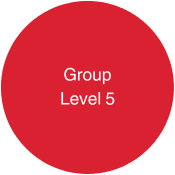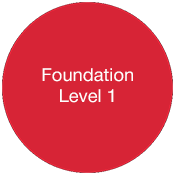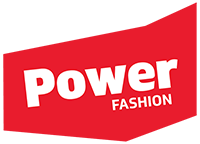Sustainability
Sustainability
The groups sustainability efforts are focused on supporting our goal of being a relevant, ethical and sustainable company.
Over 127m merchandise units produced in South Africa
Over 53% growth in local procurement in 5 years
Proving that value-retailers can positively contribute to local and global sustainability efforts. Together we can do good.
R33m donated to the Mr Price Foundation.
Over R73m invested in learning and development
68m plastic shopping bags removed from circulation.
64m products contain sustainable materials.
together
we do
good
What Does Sustainability Mean to Us?
A sustainable business understands the role it plays in the context of environmental constraints, responsible citizenship, volatile economic systems and a more conscious and demanding society.
Meaningful stakeholder engagement with customers, associates, investors, governments, civil society and suppliers guides the understanding of perceptions and expectations to provide insights to the formulation of appropriate strategic responses. Our sustainability journey is anchored in the very purpose of the business – to add value to the lives of our customers and worth to our partners’ lives, while caring for the communities and environment in which we operate.
Building a sustainable business has always been a core principle for the founders of the group. The scope of the group’s sustainability focus incorporates business operations, value chain and the communities in which the business operates.
The group is committed to the United Nations Global Compact (UNGC) Principles and uses the Sustainable Development Goals (SDGs), GRI, TCFD and the JSE Sustainability Disclosure Guide to inform our disclosure.
Innovation is critical to deliver greater value through fair social contribution and within the boundaries of the planet. Broader measurement and disclosure frameworks measure full impact on society and the environment together with the growth in capability of leaders and associates helps to deliver on our commitments. We work in partnership with key stakeholders and harness our marketing and communications through Together We Do Good, which takes customers along on the journey.
To achieve this commitment, efforts have been focused as follows:
- Increase supply chain visibility by mapping the value chain, thereby deepening supplier measurement of longevity and resilience. This will enable the group to target high impact sustainability interventions.
- Reduce and stabilise value chain impact on the planet, with immediate focus on reducing single use plastics and other non-recyclable raw materials in packaging.
- Guide and facilitate decisions that consider longevity of the business and people.
- Extend “together we do good” partnership to key stakeholders.
- As a signatory of the Retail-CTFL Master Plan 2030 of South Africa, the group continues to work collaboratively with government and industry to develop meaningful interventions to unlock a competitive and sustainable local manufacturing industry.
The group believes in the value of partnership and actively participates in selected membership organisations. These include the Ethical Trading Initiative (ETI) since 2013, the National Credit Retail Federation (NCRF), the Forestry Stewardship Council (FSC), the Kwazulu-Natal Clothing and Textiles Cluster (KZN CTC), Proudly SA and various Producer Responsibility Organisations (PROs) such as Fibre circle, Polyco and Lightcycle.
As a member of the NCRF, the group has played an active role in the development of the 2030 Retail-CTFL Master Plan and has committed to increase competitively produced products in South Africa. The group allocates key resources to build a sustainable and competitive local value chain.
The group’s partnership with The Clothing Bank and The Clothing Box, both economic empowerment projects, addresses excess merchandise and has the environmental benefit of prolonging product usage. The group is an active member of the National Retail Association which facilitates representation and participation in discussions of national interest.
Our Sustainability Outcomes
The group strives to achieve 6 key outcomes. The outcomes are rooted in the goal to build a sustainable business and value chain, as well as the vision of MRP Foundation, which is to break the cycle of poverty and inequality.
The Group aligns it’s approach to SDG implementation of global best practice, pulling from various sources to ensure it is innovative and fit for business purpose.
Supplier due diligence
To enhance value chain visibility, the supplier portal was upgraded in 2020 to map tier one and two production sites. All purchase orders now require production sites to be declared before confirmation of the order is received. This resulted in the mapping of 1 023 production sites estimated at providing 99.7% visibility, allowing suppliers to provide information on health and safety, business, labour, and environmental practices and enable the group to categorise a risk profile to each production site. Suppliers and manufacturing facilities are expected to remediate all identified issues from audits conducted within recommended timeframes and maintain audit and corrective action records. A responsible exit process applies where a lack of commitment and improvement is found. A strict supplier onboarding due diligence process ensures that trading relationships are only developed with suppliers who share the group’s values and commitment to responsible labour practices. Accordingly, the group has not onboarded any suppliers or production sites based in Xinjiang Autonomous Region due to alleged human rights violations.
Supplier performance measuring and development
The supplier grading tool is a critical enabler of value chain development. Using the tool, divisional sourcing and merchandising teams can assess the performance of individual suppliers and the broader value chain against a variety of metrics. It also assists in identifying supplier development candidates and is used to design and deliver support initiatives aligned to the group’s supplier development framework. In FY2021, online communication platforms were leveraged to deliver broad-based supplier training and conduct monthly supplier performance management sessions.
Grievance mechanisms
The group has an established hotline for grievances to be reported anonymously and promotes the KPMG FairCall facility to factory workers to encourage them to report grievances safely. Worker interviews (individual and group) are also an integral part of the social audit process. No reports of human rights violations were received via KPMG FairCall during the year. COVID-19 response and purchasing practices Dedicated group representatives manage supplier relationships within the trading divisions. A key outcome of the pandemic has been proactive and transparent communication with suppliers. Despite the inability to trade during April 2020, the group undertook to minimise the negative impact on value chain partners. Purchase order cancellations were kept to a minimum and were only actioned after collaborative consultation with suppliers at senior management level. In addition, the group provided financial assistance to suppliers for fabric ordered, and early payment was provided where necessary. No discounts were taken on previously agreed prices. As sales commenced with the lifting of lockdown restrictions, the group continued to manage supplier relationships responsibly. All purchase orders cancelled or rolled due to the South African lockdown have now been taken up.
Ethical buying practices
Regular training, supported through a licensing agreement with ETI, is conducted to equip buyers to understand the impacts of purchasing practices when engaging with suppliers. To further enhance knowledge of sustainable manufacturing processes for merchants, the group’s academy created a programme to develop production knowledge and understand decision making within the critical path. The academy has also developed in-house solutions to support ETI training.
Workers in the value chain
The group recognises its role as a lead catalyst within the value chain to influence the responsible and ethical treatment of workers. As a member of the Ethical Training Initiative (ETI), the group works on a continuous improvement model to embed practices that ensure workers’ fair treatment. To support this, the group set out to map all first and second-tier suppliers, reaching an estimated 95% visibility of all first and second-tier manufacturing sites. This allows trading divisions to measure and monitor social, environmental and business practices more closely and to guide and facilitate improved practices where necessary. A responsible sourcing framework and implementation guide for trading divisions and their suppliers guides responsible practices and is aligned to national and international regulations, good practice and implementation codes. Trading divisions monitor and guide suppliers to align their business practices and processes to the guide and the group’s code of conduct (View the code of conduct). The group acknowledges the significant complexities involved in influencing responsible practices throughout the value chain, and therefore aims to monitor, guide and instill responsible trade practices at different stages.
The diagram below illustrates the group’s sphere of influence.

Decent work and fair wages
While social audits are conducted in all sourcing countries, a specific focus has been placed on decent work in South African manufacturing facilities.
Monitoring social and environmental compliance Dedicated resources at a group and divisional level monitor and guide compliant and sustainable practices in the value chain. During FY2021, the group incorporated COVID-19 health and safety protocols into social audits to ensure worker safety. To support this, suppliers participated in a survey on COVID-19 health and safety awareness. Benchmark social audits conducted this year indicate that improvements are still required to improve health and safety practices, working hours (China) and wage compliance (South Africa) all of which are contained in group and divisional risk registers.
Mr Price Group accepts SMETA, BSCI, SA 8000, Bureau Veritas, Intertek, SGS and WRAP third-party audit standards. Low-risk audits are valid for two years, while sites with high or medium risk scores are required to submit annual social audits.
The group has developed an internal system to manage supplier corrective actions that arise from social audits. No factory with any business-critical corrective actions is onboarded. Due to the prevalence of systemic global issues, 74.7% of factories are classified as high risk, and 21.63% of the factory sites are deemed to be low risk. ETI has rated the group as having “Achiever” status due to the significant efforts being made in this area by the group.
Industry research highlights that most of the environmental impact in the fashion industry occurs in the textile production value chain. Natural resources are often unsustainably managed to deliver on production demand. The group has made a commitment to source an increased level of sustainable raw materials, and a task team has been established to develop a sustainable sourcing strategy.
In the reporting period the group continued to gain momentum in promoting the use of sustainable materials in products, which was included as a management KPI in support of the sustainability pillar of the group strategy. During the year, approximately 36 million product items incorporated sustainable materials, an increase of 3.8% from the previous year. This means that 15.8% of all products contained at least one sustainably certified raw material. Sustainable cotton was used in 26 million products and approximately 1.7 million products were FSC certified.
The group is committed to reducing its environmental impact with a particular focus on water, energy, transportation, product manufacturing and disposal. Since 2015, the focus has been to increase energy and transportation efficiency (including renewable energy), reduce water usage at head office and, in 2018, the group started introducing circular economy principles with particular focus on products and packaging materials. Suppliers are required to comply with in-country environmental legislation and regulations. Regular testing of product for the presence of a banned or restricted substance is part of the group’s quality assurance and due diligence process. In addition, standardised care instructions on apparel and home textile products encourage customers to wash and dry at lower temperatures.
The disposal of textile waste is a systemic concern in apparel value chains. Defective products are donated to South African non-profit organisations where products are repurposed and used to support female entrepreneurs. To address the concern of textile waste at manufacturing sites, the group plans to work collaboratively with its suppliers, industry and government to recycle textile waste generated at manufacturing sites.
Packaging
In 2021 Mr Price achieved a significant reduction in the number of single-use plastic bags in its store operations. Through offering reusable shopping bags and intentional communication and encouragement to customers at the point of check out, over 29 million single-use plastic bags were removed from circulation.
In addition, all single-use shopper bags were removed from Miladys stores and all reusable shopping bags available in Miladys stores are now made from recycled plastics.

Mr Price Home and Mr Price Sport stores have set a target to remove all single-use plastic shopping bags from their stores in the next two years. The group’s other store formats have set targets to reduce the use of single-use plastic bags by 75% in the next four years. Having regard to the group’s core customer who may not be able to afford reusable bags but needs to carry goods while commuting on public transport, the group is also actively exploring cost-effective alternatives to single-use plastic packets.
Mr Price customers are at the core of everything the group does and it is grateful and appreciative of their support in reducing the number of plastic packets in its stores.
Climate change
The group recognises the impact of climate change on business operations, the value chain and communities at large. In the short, medium and long term, an increasing impact is expected on the business and its communities due to changing climate patterns and extreme weather conditions, both on direct and indirect operations.
To understand the business impact, the group will be conducting a high-level climate change risk assessment in line with the recommendations and guidelines of the TaskForce on Climate-related Financial Disclosures. The assessment will guide the appropriate governance, strategy and measurement required to adequately respond to climate change. The group currently monitors both existing and emerging climate change regulations, such as the Carbon Tax Act and the Climate Change Bill. Technology, where practical, is used to reduce climate change and includes electricity meters to monitor usage in all stores and LED lighting in new stores, the DC and head office buildings.
Carbon footprint
The group has invested in roof-top solar photovoltaic (PV) systems at both the head office and Hammarsdale DC. The units run successfully and have generated 2 627 625 kWh since inception. Phase 3 is 462.25kWp at the DC.
Phase 3, which was commissioned in March 2020, consists of additional 7x50kW solar inverters and 1248×370 watt solar panels at Hammarsdale DC, and is expected to produce approximately 589942 kWh of energy per annum.
The group’s South African carbon footprint (tons of CO2e) is based on Scope 1 and Scope 2 emissions, including stores, head offices and DC.
Ongoing monitoring of store-level energy use takes place, driving behavioural change and reducing energy usage.
Since 2016, the group’s courier company has used idling cut-off systems to further fuel efficiency and reduce carbon emission.
Water
Water is a significantly impacted resource, both in South Africa and globally. The group’s greatest water impacts are in its value chain, specifically cotton cultivation, as well as fabric production and dyeing.
The group’s water consumption is currently only measured at head office locations and the distribution centre. Retail operations are generally not large users of water.
Water usage at head office has continuously been reduced, from 19 618 kiloliters in 2021 to 26 858 kiloliters in 2022.
The production processes of clothing and textiles, however, has a substantial impact on water usage. Measuring water and energy usage within the value chain has limitations but as approximately 95% of first and second-tier sites have been mapped, measuring water usage within the value chain will be explored as a future measure.
The Miladys water-wise denim collection saves millions of litres of water a year, by using recycled water.
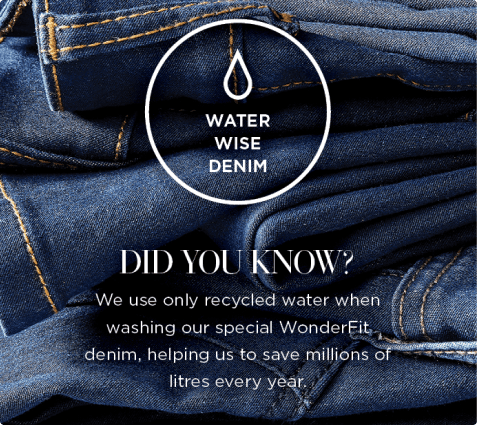
Paper
Paperless administration at store level and the promotion of e-dockets are fundamental paper-saving initiatives. The group saved
6 012 517 A4 pages of paper, 4 008 printer cartridges and 1 786 km of paper in FY2022, an estimated cost saving of R1 753 891.
Since inception, there has been an estimated cost saving of R6 789 712 and 22 488 445 A4 pages of paper.
Our culture is what separates us as an organisation and gives us our unique competitive advantage. In the year ahead we will be doing a deep dive into our values and culture to better understand what has served us well and what needs to change. This will give us the insights to articulate the cultural and leadership behaviours which will help us to build our future. These behaviours will be built into our DNA and will form part of all of our leadership and cultural initiatives. A key part of this process will be to ensure the clear integration of diversity and inclusion, and unconscious bias principles into our culture which will support our transformation strategy.
Talent acquisition
Developing and retaining home-grown talent is a strategy that has served the group well in the past and will continue to be a core focus. In order to facilitate career development and facilitate talent mobility throughout the group an online Careers Centre has been setup through our Applicant Tracking system (ATS) on Cornerstone (TMS). This ensures all our vacancies are visible to our associates and they are aware of new career opportunities as they arise. Sourcing the right skills and expertise externally when required however is equally important. Stringent pre-employment assessments ensure the required skill levels are maintained.
Talent management
The group offers many diverse career opportunities and associates are encouraged to pursue their ambitions within the dynamic and evolving working environments. Business growth and new skill requirements frequently creates new roles and most of these are filled internally, drawing from talent within the group. Our succession and High Potential Development Planning processes have been further enhanced through an improved nomination and assessment framework. This ensures constant availability of high-quality managers and executives across the group.
Associate development
Attracting, developing and retaining talent is critical to our competitiveness and long-term sustainability. We strive to deliver high quality and relevant training through the MRP Academy. The academy’s impact relies on specialist learning and development managers working with subject matter experts to develop and facilitate business-focused and blended learning interventions.
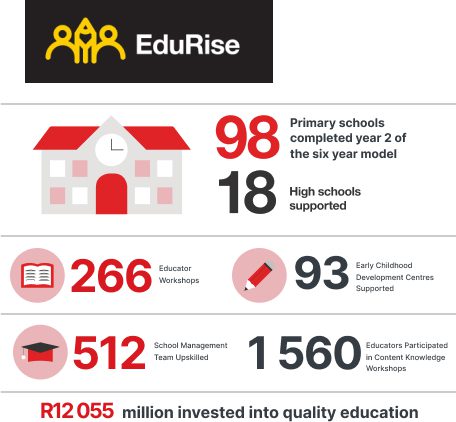
The business cares about young people in the communities in which it operates. An annual investment, equivalent to approximately 1% of net profit after taxation from South African operations, is made into South African communities through a donation to Mr Price Foundation. The foundation, a registered non-profit organisation (with public benefit organisation status), was established in 2005 to focus on South Africa’s youth development.

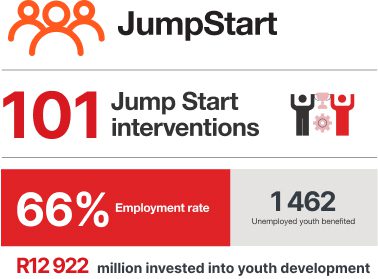
Through demand-driven development, the Jump Start programmes develop the skills of unemployed youth by bridging the gap between school/tertiary education and the working world. MRP Foundation programmes attempt to address systemic challenges while being realistic in delivery through on-the-ground approach to implementation. This supports the South African Government’s National Development Plan and SDGs, aimed at positively impacting the socio-economic landscape of South Africa. To achieve this, the MRP Foundation works with like-minded organisations that connect strongly on purpose.
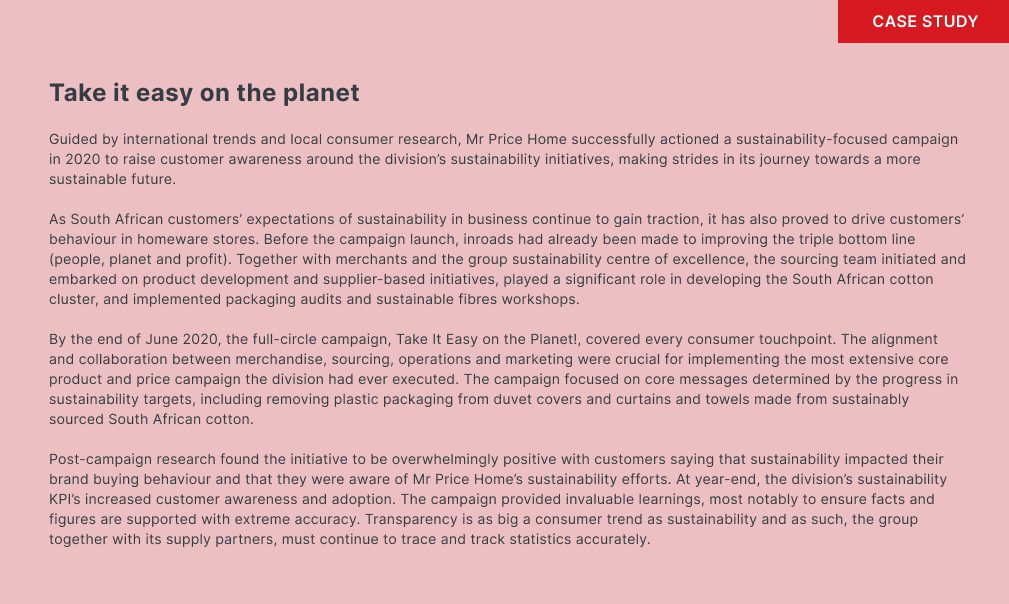
Transformation
We’re passionate about driving social and economic transformation in a way that is both meaningful and sustainable and we are committed to meeting the requirements of Broad-Based Black Economic Empowerment (B-BBEE) in South Africa, under the Revised Codes of Good Practice. As soon as the group’s B-BBEE status is finalised the compliance certificate will be published on the group’s website as required by the JSE LR.
